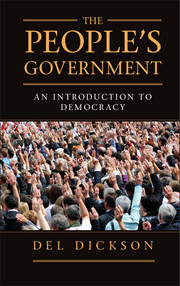Book contents
- Frontmatter
- Contents
- Acknowledgments
- Prologue
- 1 Liberty and Freedom
- 2 Freedom or Liberty?
- 3 Rights
- 4 Participation and Representation
- 5 Inclusion
- 6 Equality
- 7 Power
- 8 The Case against Democracy
- 9 The Case for Democracy
- 10 Building a Stable Democracy
- 11 Three Misconceptions about Democratization
- 12 How Democracies Die
- 13 How Democratic Is the United States?
- Glossary and Biographies
- Bibliography
- Index
- References
10 - Building a Stable Democracy
Published online by Cambridge University Press: 05 August 2014
- Frontmatter
- Contents
- Acknowledgments
- Prologue
- 1 Liberty and Freedom
- 2 Freedom or Liberty?
- 3 Rights
- 4 Participation and Representation
- 5 Inclusion
- 6 Equality
- 7 Power
- 8 The Case against Democracy
- 9 The Case for Democracy
- 10 Building a Stable Democracy
- 11 Three Misconceptions about Democratization
- 12 How Democracies Die
- 13 How Democratic Is the United States?
- Glossary and Biographies
- Bibliography
- Index
- References
Summary
In a republican nation whose citizens are to be led by reason and persuasion and not by force, the art of reasoning becomes of first importance.
– Thomas JeffersonEvery construction project needs the right materials, and converting an authoritarian regime into a stable democracy is no exception. What is needed to build a democracy? As with any undertaking, there is some flexibility in the details. Not everything mentioned in this chapter is necessary, although the more of the right stuff the better. Whether designing a free or liberal democracy, the fundamentals are the same. Building a stable democracy requires a sophisticated understanding of politics, history, economics, sociology, psychology, architecture, social engineering, and alchemy. After discussing the main paths by which authoritarian regimes democratize, the rest of the chapter is organized according to three levels of analysis: individual, societal, and institutional requirements.
PATHS OF DEMOCRATIZATION
How do authoritarian polities become democratic? Political scientist Samuel Huntington identified three major pathways: evolutionary, cyclical, and dialectical.
The evolutionary path refers to the gradual, organic development of democratic habits and institutions over time. It is sometimes called linear development, although in practice it is rarely a straight line, and democracy might be a long time coming. This slow-and-steady approach, however, is most likely to yield long-term stability. Switzerland, the United States, and the United Kingdom are leading examples of evolutionary democracies.
- Type
- Chapter
- Information
- The People's GovernmentAn Introduction to Democracy, pp. 130 - 192Publisher: Cambridge University PressPrint publication year: 2014



